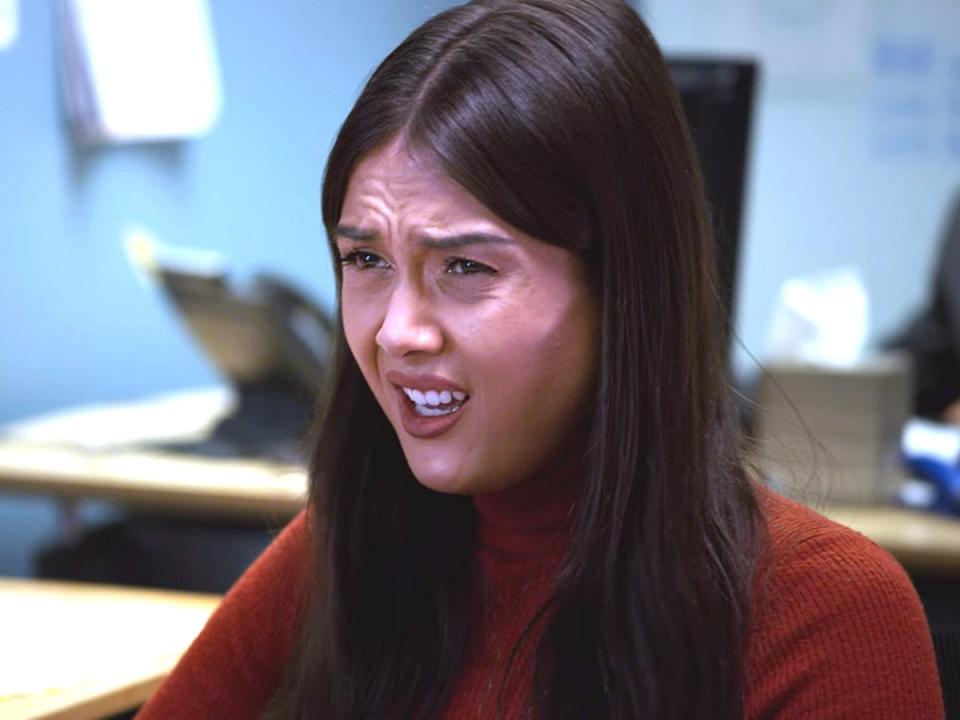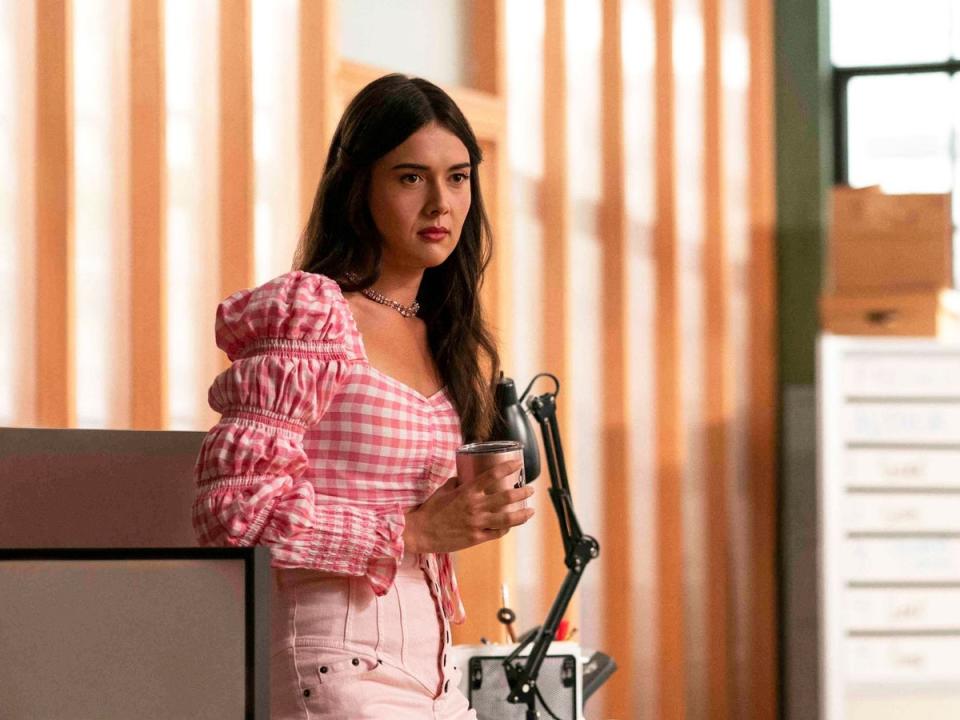Patti Harrison: ‘Not everyone is ready to have a laugh at beheading videos’

As a child bored at home in Ohio, Patti Harrison would pretend to be a basking shark. On sunny days, light would pour into the living room and illuminate every dust particle.
Young Patti would open her mouth as wide as possible and swim through this shimmering cloud of dirt, sucking in the dust like it was plankton.
She reenacts it for me now, dropping her jaw and worming the upper-half of her body.
“Sometimes I did it for my family. Sometimes just for me,” the 31-year-old says. “It was so stupid. My asthma was so bad; I was on a breathing machine.” Such is Harrison’s commitment to the bit, even back then.
In truth, the idea of Harrison playing a 10,000 lbs fish isn’t as outrageous as it sounds. The role, in fact, might fit nicely with the body of work she has amassed so far. The LA-based actor, writer, and stand-up comedian is one of a handful of stars to have ascended from the alternative comedy scene.
But in recent years, Harrison’s talents have gone mainstream; this week, she wraps a sold-out run at the Soho Theatre with a show that she is next week taking to the Edinburgh Fringe.
She is making her mark on screen too, in Netflix’s animated coming-of-age series Big Mouth, for which she also writes. Of course, there’s also her scene-stealing moments in Tim Robinson’s sketch show I Think You Should Leave.
Her performances – absurd, profane, and gonzo to the extreme – make even the smallest roles memorable. Think of Harrison calling someone’s grandma a “slut” in Sandra Bullock’s The Lost City, or her character in the Hulu adaptation of Lindy West’s 2016 book Shrill.
As Ruthie, she tosses off lines like, “Did you know that fruit was actually the original inspiration for candy?” with her signature laconic delivery. Factor in her talk-show appearances and frequently viral Instagram presence, you’ll soon realise that Patti Harrison is everywhere.
But right now, Patti Harrison is here: sitting in a booth of a west London diner. She has arrived in all-black, except for a chunky silver necklace with a green heart pendant.
It’s chic business casual, which isn’t surprising given that her characters, deranged though they are, always know how to pull together an outfit.

She is jet-lagged, though; running on three hours’ sleep. Later, Harrison shows me a special brand of eye drops that keep her from looking like a zombie; “I don’t think this is even legal in the UK.”
Maybe it’s partly due to exhaustion that she is being earnest; too tired to keep up the schtick. Within minutes, she divulges that she gets incredibly nervous before shows and tells me she recently re-entered therapy. She also admits to being so “thin-skinned” that she can’t check her Instagram DMs or read reviews.
I’m almost waiting for the bait-and-switch, for the carpet to be pulled out from under me with a filthy joke about erectile dysfunction or murder. After all, that’s how most of her comedy goes.
Consider her stand-out sketch in season two of I Think You Should Leave, in which Harrison plays an office worker. In it, she and her co-workers learn that corporate has purchased a new printer for their floor and a man jokes: “I guess Christmas came early this year!” The casual quip earns a few chuckles.
Harrison’s character chimes in, “Santa should have wrapped it.” The joke doesn’t land. She forges on. “And Santa and all his elves must have worked so hard on it, and then they gave it to us early?” Silence. She tries different iterations of the joke, putting on strange, cartoonish voices but is only met with blank stares.
It’s classic Harrison, masterfully riding the knife’s edge between sincerity and irony. Delivered with a deadpan so serious, it evokes equal parts discomfort and surreal sympathy.
Harrison grew up one of seven sisters in Orient, Ohio, a town whose population swings between 200 and 300 in any given year. At home, the Wayans Brothers ruled supreme. When she was nine, Harrison’s favourite films were Scary Movie and its sequel. “I was way, way, way too young to watch them. There’s a lot of come-based humour in those movies,” she laughs.
Old enough or not, Harrison became enthralled by its stars, Anna Faris and Regina Hall. “They would add gravitas to the dumbest line. I was excited to see them not hamming it up; they treated it as if it were serious.”
Kristen Wiig and Lisa Kudrow were her other idols (“I mean, obviously; please shoot me in the head right here for saying Phoebe from Friends is iconic”). Harrison adds, “I think it’s incredible to see these people taking this really silly s*** very seriously in their delivery.”
When Harrison wasn’t watching movies inappropriate for her age, she was browsing Rotten.com, a website, she says, that’s inappropriate for any age.

Many millennials will remember the shock site; most will wish they could forget it. Rotten.com traded primarily in images of death: gory, up-close aftermath of car crashes, suicides, terrorist attacks, beheadings. “I’m always afraid to talk about it because I don’t want people to go look at it!”.
Fortunately, the site has been defunct since 2017. But the impact Rotten.com had on Harrison – and her sense of humour – was admittedly “huge”, largely because of her own early dealings with death. “I had some pretty… How do I word this?” she wonders aloud before a pause so long that I wonder if she has changed her mind about saying it at all.
“There was a culture of death in my family during my early childhood. My dad and my brother died; I had a sister who died before I was born.” When her dad died, Harrison was six and confused. “Why is no one saying he died?” she remembers thinking. “Why are they saying he ‘passed away’?”
It was years before she understood her father was gone, even after she saw him in a casket at the funeral. “There wasn’t a lot of clarity there.” “Look at me,” Harrison raises the fork in her hand and grins, “shovelling beans into my mouth and talking about death”.
When she and her friends discovered Rotten.com as teenagers, it was like an “explosion of morbid fascination”. It’s pretty traumatising to see that stuff as an adult, “but kids trying to contextualise murder photos…” She chuckles. “It’s kind of cool if you think about it.”
She’s kidding, she tells me, likely in the knowledge that many an interviewer has misread a Harrison wisecrack. She knows it’s not exactly acceptable to laugh at what she finds funny; she is actively trying to temper that side of her – in public, at least.
“I’m trying to be more thoughtful about the fact that not everyone is on the same page as me. You know, not everybody is ready to have a laugh at beheading videos or something.”
These days, Harrison is trying to be more understanding. She is trying to process the anger of people pigeonholing her as a trans comedian, and the frustration of well-meaning peers giving her offensive scripts to read.
It’s been a long road, though. Harrison began taking improv classes before she came out as transgender and moved back home to Ohio. In 2015, she moved to New York to pursue comedy full-time.
It wasn’t until 2017 that Harrison got her big break. She was invited on The Tonight Show Starring Jimmy Fallon to perform a bit about Donald Trump’s transgender military ban.
From that cameo came auditions for bigger parts and meetings with TV execs. “It was really exciting,” Harrison recalls, until she realised the one thing every offer had in common.

“There were all these opportunities but they were really specific opportunities to speak about politics and trans issues. These people weren’t necessarily tapping me because they wanted my comedic talent; they were tapping me for what they see me as, which is trans.”
She had unintentionally made a name for herself as a political comedian when in reality all she wanted to do was crack jokes about corgis with “HUGE tits”.
“It’s that social media-liberal thing,” she explains. “We’re being bludgeoned with more information than ever and people are oversimplifying their perceptions of others in a way that makes sense to them.”
They assume that because Harrison is a transgender comedian, “her thing” must be social justice. Some people leave her shows disappointed by the set. “They expect to see a comedy show where I’m talking about trans and non-binary folx and using the word folx and talking about hormone injections, being likem ‘Yas queen slay,’” she cringes. It’s an expectation that gets under her skin.
“I feel minimised and I feel like when I stray from that space and talk about people getting skinned – I won’t say who – they get angry or whatever.” This happens less and less as she becomes more known. (In fact, people are so familiar with her schtick that she’s looking to switch it up; “They’ve cottoned on so I guess I have to write another joke.”) But she is equally resigned to the fact it may always be the case.
“There’s gonna be times people come expecting me to make unicorn jokes about pride and they’re allowed to want to seek that out, but they can’t be mad if I make jokes about me rosebudding and then prolapsing and then cutting off my prolapse.” She smiles cherubically.
Harrison understands representation is important. Truly, she does – but it’s never something that informed her comedy. “I want to use what power I have to uplift other people in my specific community but it’s also very easy to get pigeonholed in that,” she says.
“It sucks because you would love for your work to be appreciated on its own merits and not because people want to pat themselves on the back because they went to a diverse show.” Harrison continues, “Bless people who are articulate enough to go on camera and talk about their political points of view because I really can’t. I just don’t grasp facts that way.”
Like a bloodhound, Harrison sniffs out the potential joke and adds, straight-faced: “My brain doesn’t hold facts; it holds come. And it doesn’t even hold that much, like two fluid ounces.”
Early on, she accepted some of those offers – the one-note characters or the sort that were stereotyping “in a strange well-intentioned” way – because she needed a pay cheque.
“I could be a lot further along in my career if I had said yes to more of those opportunities to play the struggling trans person blah blah blah. And I do think those are important roles to show but that’s just not the path I wanted to continue down.”
Harrison still receives scripts like that, or is asked to play well-intended characters that writers don’t realise are offensive. The old Patti would have shouted them down, but she’s softening. Or trying to.
“I know that intention isn’t impact but I’ve had people who are well-meaning want to make something with me and then they write something that’s offensive but they don’t understand why. If I have the energy that day and the person is being nice enough, I think it’s important for me to say, ‘Hey, I actually disagree with this and here’s why,’ and not be hyperbolic about it because they’re not coming from a place of harm.”
She continues, “I think we’re in a place with this social media liberal brain rot where it’s so easy to be like, ‘F*** you, this complete dumbass wrote this horrible thing’ and wanting to dunk on them.”
You would love for your work to be appreciated on its own merits and not because people want to pat themselves on the back because they went to a diverse show
Harrison knows it’s not her job – or anyone else’s – to educate others but when she is up for it, she thinks it’s worth a go. But that doesn’t mean it’s not scary to do: “I’m very conflict-averse. It has taken me a lot of energy to learn how to say no to that stuff, and then to get to a point when I’m not only saying no but saying no because I think it’s bad.”
That’s why it sucks when they get defensive, which, she says, is usually the case. “People don’t want to see themselves like that. People are scared of being called transphobic. They go, ‘I’m not transphobic. I’m not transphobic.’ And I’m like, ‘Ok, chill out. I’m not saying that you are but… this is a little transphobic.’” She laughs.
Empathy hasn’t always been her modus operandi. It’s a point of view shift for sure, she says. “Me online in the year 2016 was the worst version of me. I was just screaming at everybody” but “if I claim to want to have discourse, I need to have the ability to have discourse.
To hold space for someone I disagree with. I’m trying to deprogramme the social media-conditioned idea of liberal communication because I feel like it’s not actually productive towards my goal, which is to be understood. To do that, I think you have to meet people where they’re at, with the tools that they have because we’re all f***ing fallible.”
All of this – the social media musings, the self-realisations, and, you know, the trauma – has found its way into her new show. It’s silly as usual, Harrison says, “but it’s also my show coming out of therapy again” so naturally things get a little dark.
Her set last night at the Soho Theatre veered slightly too far into the gloom. “It was depressing. There were a lot of groans from the audience.” She toyed with the idea of adding a moment of catharsis to bring the set full circle. “I feel like structurally that’s what people are pushing for. Especially in a show that deals with a lot of dark stuff, they want some hopeful moment that’s really profound or whatever the f***.” So she considered it, but knew it wasn’t right.
“That’s just not me. I do talk about personal stuff but I’m not going to shoehorn something in there that feels not fun to do,” she says. “I’d rather make this messy s***pile where I’m having fun and it feels good.”
Instead, she is mulling over the idea of closing with a song called “S*** is Poop” sung in the style of Stevie Nicks. “I think that’ll be my profound answer to all the trauma.”
Patti Harrison will perform at the Pleasance Courtyard in Edinburgh from 3 – 15 August

 Yahoo News
Yahoo News 